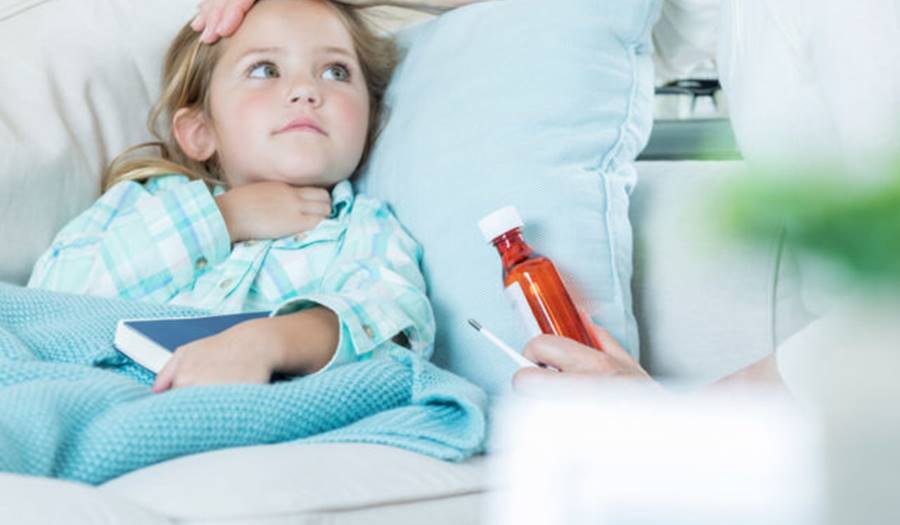
Fever
12/7/2020
Friend or Foe?
Fever is one of the most common reasons parents call for advice and can be very scary for parents. But once we know more about fever, we can see there is nothing to fear. Fever is not the enemy but a healthy response and part of our immune system. Everyone will have a fever at some point, especially young children. Let’s learn more about fevers, when you should be concerned, and how to help your child while they have a fever.
WHAT IS A FEVER?
Fever is the body’s way of fighting infection. Fever is actually your body’s response to a viral or bacterial infection to help stop the virus or bacteria from multiplying. A fever helps increase immune chemicals that fight infection and also creates an inhospitable environment for bacteria and viruses. Viruses are the most likely cause of fever, causing fever 10 times more often than bacteria. A fever can last upwards of 3-5 days, sometimes longer!
A fever is any temperature 100.4 degrees or higher. When your child has a fever, that temperature may change based on time of day. Everyone’s temperature fluctuates during the day. Our temperature is highest in late afternoon/early evening and is lower in the early morning. That means a fever will be even higher in the evening and may seem lower in the early morning. Your child’s temperature can also be affected by their clothing. A child who is overdressed or bundled up will have a higher temperature.
Taking your child’s temperature
In order to determine what your child’s temperature is, you must take an accurate measurement. For infants less than 6 months old we recommend ONLY using rectal digital thermometer. This is the most accurate measurement. An ear thermometer should never be used in an infant less than 6 months old. Pacifier thermometers also should never be used. They require 3-4 minutes of sucking to be accurate. Rectal thermometers should be labeled as such so they aren’t used in anyone’s mouth. When taking a rectal temperature, you should only insert the tip ½-1 inch and it should not be difficult. Also note, taking a temperature this way can stimulate stooling, so we recommend doing it on a changing table or with a diaper or towel under your child.
In children over 6 months of age, a digital temporal artery (aka forehead) thermometer (not the strips that stick to the forehead) or a digital oral or underarm thermometer can be used. If your forehead thermometer gives you radically different temperatures if you take your child’s temperature a few times, consider changing the battery as an older battery can affect the performance of the thermometer. We also do not recommend ear thermometers in older children as a poor fit will give inaccurate readings as will recent outdoor time and they method is not reliable.

Symptoms of a fever
When your child has a fever, their skin will feel very warm and may appear flushed or red. They may also shake or shiver. They may be sweaty at times or clammy feelings. Sometimes their hands and feet will feel cold to the touch. They may complain of body aches, joint pain, or a headache. Children also have decreased appetite during a fever. This is not concerning as long as they are drinking plenty of fluids and some of those fluids have calories in them such as juice or popsicles.
Fever also makes their heart rate and respiratory rate increase. Your child’s heart may beat 7 more beats per minute for every degree of fever and they may breathe 1-2 more times per minute for every degree of fever. That means if your child has a 103.6 fever (5 degrees above average) their heart rate will increase 35 beats every minute and they will breathe 5 more times a minute. A child who is 9 months old can have a heart rate from 100-160 beats a minute normally so you may feel their heart beating very quickly! A 9-month-old baby also breaths about 25 times a minute so they may appear to be “panting” when they have a fever.

WHEN SHOULD I WORRY?
Fever in a child less than 3 months old is considered an emergency. If your child is less than 3 months old, we recommend you call us immediately for advice. Do not administer an anti-fever medication such as acetaminophen or ibuprofen.
In children over 3 months of old, fever itself is not a cause of concern. Fever does not cause brain damage. It is a natural part of your body’s response to a viral or bacterial infection.
Reasons we need to hear from you IMMEDIATELY if your child has a fever include:
• Your child is less than 3 months old
• Your child looks very ill or is extremely irritable or unusually drowsy
• They were in a hot car or an environment where they were exposed to prolonged high temperatures
• Your child has a stiff neck and/or a severe headache not relieved by pain medication or fever reducer
• Your child is exhibiting signs of dehydration such as dry mouth, sunken soft spot, no wet diapers in 12 hours or is unable to hold down or take in fluids
• Your child has immune system complications such as sickle cell disease, cancer or is on immunosuppressive medication
• Your child is having difficulty breathing
Reasons we need to hear from you but NOT emergently (meaning you do not need to call the Emergency on-call provider and you can wait until the office is open)
• Your child has other symptoms such as a sore throat, ear pain, a rash, or repeated or prolonged vomiting and diarrhea
• The fever lasts longer than 48-72 hours
• You need medication dosing…all this is on our website as well as the manufacturer’s websites. All dosing is based on your child’s weight
Your child will need to be evaluated depending on HOW your child LOOKS and ACTS, not based on how high the fever goes. If your child is drinking enough to stay hydrated, can rest comfortably, and is able to play or interact for short periods they do not need to be evaluated immediately. If your child is not sleeping, sleeping too much, or not taking fluids., you should call us for advice and possibly an evaluation. We often see children in the office who have a temperature of 104 degrees who are happy, active and drinking well, while other children at 101 degrees look very sick and aren’t taking in in enough fluids. Don’t worry about numbers and look at your child to determine your course of action.
WHAT ABOUT FEBRILE SEIZURES?
A febrile seizure is a seizure that occurs during a fever. Febrile seizures occur when your child’s temperature goes up quickly NOT how HIGH the fever is. A febrile seizure rarely happens more than once in a 24hour period. These seizures DO NOT harm your child’s brain or nervous system. They do not result in death or intellectual changes.
Febrile seizures can happen in 3-8% of all children. They are most common in children 6 months to 5 years. They also run in families. If your child has a febrile seizure, they are more at risk of having another seizure. About 50% of children who have a febrile seizure before they are 1 year of age will have another. And 30% of children who have their first febrile seizure after they are 1 year of age will have another. Only a small number of these children will also have epilepsy.
If your child has a febrile seizure, make sure they are in a safe place such as on the floor or on a bed. Make sure there are no sharp or hard objects that could hurt them nearby. Roll your child onto their side in case they vomit. If the seizures last longer than 5 minutes, call 911. If the seizure is shorter than 5 minutes, please call our office so that we may arrange to evaluate your child for the cause of the fever.

WHAT SHOULD I DO IF MY CHILD HAS A FEVER?
If your child has a fever, we recommend treating for comfort. First, we want the immune system to be able to do its job. By lowering your child’s temperature, we take away that mechanism. Also, fever reducers do NOT cure the fever. They simply reduce the fever so that your child is more comfortable. Therefore, we should base all treatment not on the number or height of the fever, but how your child LOOKS and ACTS. If your child is drinking fluids, sleeping well, and having short or long periods of playing, you can just monitor the fever and do not need to give medication. If your child is not drinking well, is unable to rest, or is uncomfortable then you may determine they need medication. We recommend acetaminophen for children over 3 months of age or ibuprofen for children over 6 months of age. Remember to always use the cup or dosing syringe that came with the medication. Household spoons are not accurate. If you lose the dosing device, please ask your local pharmacist for a replacement.
FEVER REDUCING MEDICATION
Acetaminophen(brand names Tylenol or Feverall)
Acetaminophen is a fever and pain reducer that is sold over the counter. It comes in infant and children’s syrups (these are the same concentrations), chewable tablets, orally disintegrating tablets or powders, suppositories, capsules and tablets. Do not give Tylenol to a child less than 3 months old without discussing with your provider first.
Your child’s dose is based on their weight. Acetaminophen can be administered every 4-6 hours but not more than 5 times in 24 hours.
Click here for a link to our website for Acetaminophen dosing.
Ibuprofen(brand names Motrin or Advil)
Ibuprofen is a fever and pain reducer as well as an anti-inflammatory medication. Ibuprofen comes in infant drops, children’s syrup (these are different concentrations unlike Tylenol), chewable tablets, capsules, and tablets. This medication is only for children 6 months and older.
Dosing for ibuprofen is based on your child’s weight. This medication lasts for 6-8 hours.
Click here for a link to our website for Ibuprofen dosing.
Aspirin(brand name Bayer)
We do NOT recommend using aspiring with children due to side effects such as upset stomach, intestinal bleeding, and Reye syndrome. Reye syndrome causes brain, liver and organ damage when children with certain viruses are given aspirin.
Aspirin can be purchased over the counter and comes in swallowable or chewable tablets. It can be given every 4-6 hours unless it is a delayed release formulation.
COMFORT MEASURES
Fever reducing medication is not the only way to help your child when they have a fever. Here are some things that you can try:
• Keep their room or your house cool
• Have your child dress in light layers
• Push fluids including water, diluted juices, popsicles or electrolyte solutions. You can also offer foods with high water content such as yogurt, apple sauce, or fruits.
• Give your child a lukewarm bath (no ice or rubbing alcohol baths no matter what Grammy says) or provide cool compresses to their forehead or body
• Let them rest but do not confine them to their room, allow them to play but do not let them become overexerted

Evaluations
Emergency Room
Most children do NOT need to go to the emergency room with a fever. If you are concerned about your child’s fever, please call the office to discuss before proceeding to the Emergency Room. Often a trip to the ER is either a VERY expensive dose of fever reducer or can result in unnecessary testing that can be traumatic for your child.
Your child will need to be evaluated in the emergency room if they have a febrile seizure lasting longer than 5 minute or if you discuss your child’s symptom and we recommend an evaluation in the emergency room. If your child has other symptoms such as ear pain, a sore throat, a rash or mild vomiting or diarrhea we do NOT recommend an immediately evaluation in the ER. We recommend keeping your child comfortable and call our office for an advice or an appointment for an evaluation. ER visits for childhood illness expose your child to extra infectious agents such as viruses as well as burdening the emergency room.
Office visits
We recommend an evaluation in our office for any child who had a short febrile seizure and any child who has symptoms with their fever than need an evaluation such as ear pain or a sore throat. We also recommend seeing any child with a prolonged fever meaning a fever that last longer than 72 hours with or without other symptoms. Also, if your child is being treated for an infection with antibiotics and their fever last longer than 48 hours after treatment was started, you should talk to your provider and possibly have your child reevaluated.
Fever is one thing all parents will experience with their child at some point. It can be scary but after learning about fever, we need to treat fever like the friend it actually is. It usually is a reassuring sign of a healthy immune system functioning just like it should. Your child’s body is fighting off viruses and sometimes bacteria. While their body is doing this hard work, we can comfort them with baths, rest, and sometimes with fever reducers.
Children’s Health Care of Newburyport, Massachusetts and Haverhill, Massachusetts is a pediatric healthcare practice providing care for families across the North Shore, Merrimack Valley, southern New Hampshire, and the Seacoast regions. The Children’s Health Care team includes pediatricians and pediatric nurse practitioners who provide comprehensive pediatric health care for children, including newborns, toddlers, school aged children, adolescents, and young adults. Our child-centered and family-focused approach covers preventative and urgent care, immunizations, and specialist referrals. Our services include an on-site pediatric nutritionist, special needs care coordinator, and social workers. We also have walk-in appointments available at all of our locations for acute sick visits. Please visit chcmass.com where you will find information about our pediatric doctors, nurse practitioners, as well as our hours and services.
Disclaimer: this health information is for educational purposes only. You, the reader, assume full responsibility for how you choose to use it.








